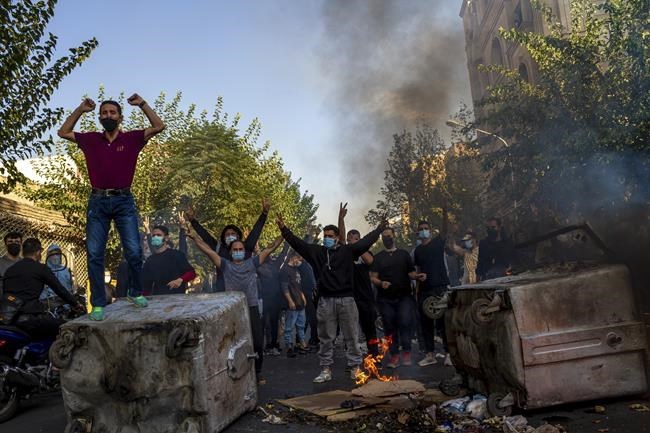OTTAWA — Canada has added Iran's national police force and an Iranian international university to its sanctions list, even as Parliament calls for Tehran to be expelled from the UN's Commission on the Status of Women.
Foreign Affairs Minister Mélanie Joly announced the sanctions against Iran's Law Enforcement Forces and Al-Mustafa International University on Monday in response to the Iranian government's continued crackdown on weeks of protests.
The nationwide protests first erupted over the Sept. 16 death of 22-year-old Mahsa Amini in the custody of the country’s morality police. She was detained for allegedly violating Iran’s strict dress code for women.
Although the protests first focused on Iran’s mandatory head scarf, or hijab, they have since transformed into one of the greatest challenges to the ruling clerics since the chaotic years following the 1979 Islamic Revolution.
Joly accused the Law Enforcement Forces of participating in the suppression and detention of Iranian protesters.
Security forces have dispersed gatherings with live ammunition and tear gas over weeks of sustained protests. At least 270 people have been killed and 14,000 arrested, according to the group Human Rights Activists in Iran.
Joly also accused the Iranian government of using Al-Mustafa University, which has branches in several countries, to spread its ideology abroad and recruit foreign fighters.
Canada is also adding four individuals, including the police commander of Tehran, to its sanctions list, which now includes 93 people and 179 entities.
Those listed will have their Canadian-held assets frozen as Ottawa tries to enact a new law to seize those assets and disperse them to victims and human rights defenders.
"The Iranian people, including women and youths, are risking their lives because they have endured for far too long a regime that has repressed and violated their humanity," Joly said.
"They are demanding that their human rights be respected, and it is our duty to echo and amplify their voices. Canada will continue to support the Iranian people as they courageously demand a better future."
Hours after the sanctions were revealed, members of Parliament gave unanimous consent to two motions brought forward in the House of Commons in English and French backing Iran's removal from the UN status of women commission.
The motion echoed a similar call published in an open letter in Sunday's New York Times that was signed by prominent female politicians from a number of Western countries, including Deputy Prime Minister Chrystia Freeland and Joly.
Former prime minister Kim Campbell and human rights activist and author Nazanin Afshin-Jam are the other Canadians on a list of "key signatures" to the letter.
The letter says Iran should have been disqualified for its long-standing, systemic oppression of women, as well as its recent brutality towards human-rights protesters.
Iran began a four-year term on the UN status of women commission earlier this year. Canada is not currently a member.
The sanctions and House of Commons' motions came as Iranian authorities announced they will hold public trials for 1,000 people over the protests that have convulsed the country.
The mass indictments mark the government's first major legal action aimed at quashing dissent since unrest erupted more than six weeks ago.
Iran's state-run IRNA news agency quoted judicial officials as saying that a thousand people who had a central role in the protests would be brought to trial in Tehran alone over their "subversive actions," including assaulting security guards, setting fire to public property and other accusations.
This report by The Canadian Press was first published Oct. 31, 2022.
— With files from The Associated Press.
Lee Berthiaume, The Canadian Press



